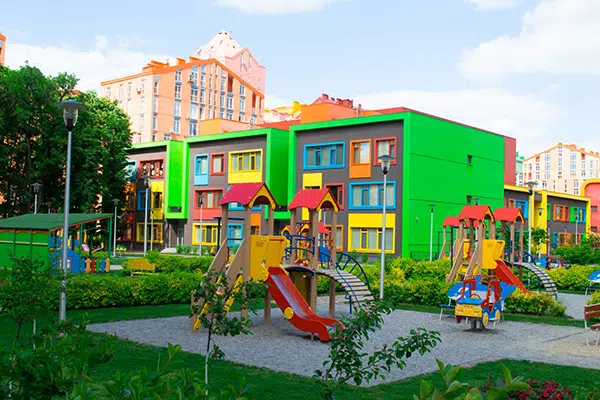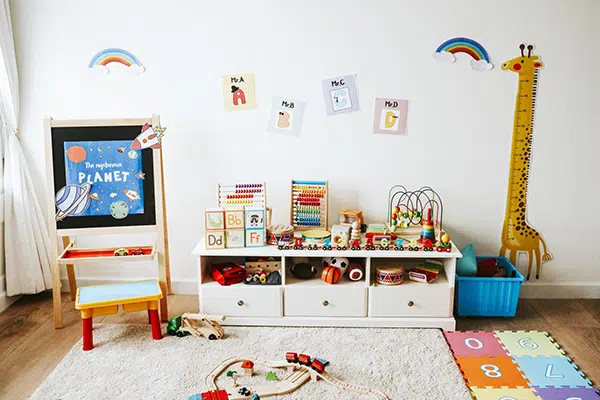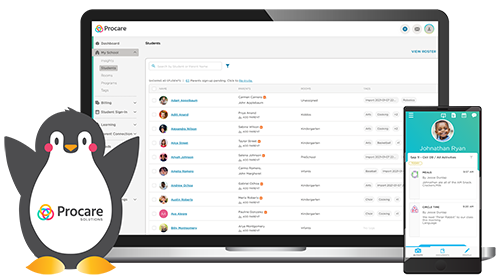This blog was originally published on Feb. 26, 2021, and updated on Jan. 3, 2025, with new information.
Demand is high for child care, but daycare start-up costs can be daunting.
Let’s take a look at the seven main costs you’ll need to account for when starting your own child care business.
Opening a Daycare Center
There are A LOT of variables when it comes to daycare center expenses. So let’s look at the factors you should consider as you create a budget and research owning a child care center.
1. Location

Where will your child care center be located? You have two options in this regard: a rented/owned space or your home. Each has its own advantages and disadvantages.
Costs for starting a home-based daycare range wildly. According to bizfluent.com, a website about small businesses, the average startup cost for a daycare center ranges from $10,000 to $50,000. This number is higher if you’re going through a franchise.
Remember, this can vary widely depending on whether you’re opening a home-based daycare or leasing a separate facility for your care center.
And you must factor in space costs. For example, a commercial space will require you to make lease or loan payments. These can be expensive depending on real estate costs in your area. But a large commercial space will also allow you to care for more children, which will boost your income.
Check out this guide to start-up costs for a child care center licensed for 76 children, ages 6 weeks to 5 years old to get an idea of what to expect.
Running your daycare out of your home, on the other hand, will save you money on rent. But don’t forget to budget for an increased utilities bill. And realize that state laws might not allow you to care for as many children in your home as in a commercial space.
2. Licensing
To become a legal daycare center in the U.S., you need a business license and tax identification number. Some states also require a daycare license, CPR certification and medical clearance. These things cost money.
Check the laws in your area to learn what licenses you need, how much the licenses cost and how often they need to be renewed. The Procare Solutions resources page has a state-by-state breakdown of what’s available.
While these expenses should be factored into your business budget, they don’t often amount to a significant sum of money. P
For more information on licensing, contact the Department of Children and Family Services in your state. Or get in touch with a local child care licensing agency. Both entities will be able to provide you with the details you need to make your new child care business legal.
3. Insurance
Every child care business should invest in insurance. We can’t stress this enough!
There are two main policies you’ll need: a liability policy and a property policy. Note: you’ll need property insurance even if you plan to run your daycare center from home. Most homeowners policies won’t cover claims related to your business.
If you plan to hire employees, consider investing in workers’ compensation insurance as well. Get in touch with the child care provider licensing office in your area for more information.
Like all the daycare center expenses outlined here, the cost of your insurance policies will vary. But many child care centers are struggling to keep or find insurance. Check out our episode of the Child Care Business Podcast on the topic in which Samantha Phillips, an insurance broker who specializes in insuring child care centers, gives her tips on how daycare owners can navigate increasing premiums.
4. Supplies and Equipment

Now that you have a location for your business and you’re properly licensed, you can invest in supplies and equipment.
Of course, you’ll need the obvious things like cribs (if you plan to care for babies), cots (if you plan to care for toddlers), changing tables, high chairs and child-proofing. But don’t forget about consumables like cleaning supplies, diapers and wipes and food.
Budget $600 per child for large pieces of equipment like cribs and high chairs. Then plan to spend about $100 a week per child for consumable supplies. (Note: these expenses should decrease as your daycare center becomes more established; plus you should be charging tuition that offsets these costs and helps you turn a profit).
Check out this average budget for daycare provider expenses from NEXT Insurance for a home-based child care business serving four to six children:
- Furnishings: $ 2,500
- Equipment: $ 2,500
- Supplies: ($50 per child per month): $2,400 to $3,600
- Water and trash: $1,800
- Phone and electric: $4,000
- Business licenses and fees: $1,200
- Food and beverages: $4,800
- Transportation: $3,600
- Part-time aides/substitutes: $10,000
- Advertising and marketing: $4,000
- Total: $36,800 to $38,000
5. Children’s Entertainment
You may have noticed that we didn’t include toys in the section above. That’s not because you don’t need them — you definitely do!
A quality selection of age-appropriate entertainment will ensure your kids enjoy coming to your daycare center. Happy kids make happy parents. And happy parents keep paying child care providers like you to care for their children. So it makes sense to invest in toys.
The entertainment options you choose will depend on the kids you care for, the amount of room you have and your current budget.
For example, if you have access to a yard and a few hundred dollars, an outdoor playset might be a good idea. But only if you plan to watch children who are old enough to take advantage of it. If not, choose something else.
Other children’s entertainment ideas include:
- Books
- Puzzles
- Blocks
- Costumes
- Art supplies
- Musical instruments
- Educational curricula
- Dolls and action figures
- Balls and sports equipment
- Tablets, TVs and DVD players
6. Employees
Many child care providers start as one-person operations. But as your business expands, you may need to hire employees to help take care of children enrolled in your preschool or child care center. This means your daycare center expenses list will get longer and more costly.
Recent federal data shows that the average child care worker earns about $30,000 a year, or $14.60 an hour. But many centers are paying well above that to attract good job candidates and to stay competitive with other occupations offering a higher wage.
You’ll need to pay employees a regular salary plus their Social Security and Medicaid taxes.
7. Advertising
Not all child care centers will need to invest in advertising. You may be able to get customers by reaching out to your network and posting on social media. But if you’re looking to start your new business with a bang, advertising can help.
If you’re on a budget, print flyers and distribute them throughout your community. If you’re feeling ambitious, create a Facebook ad or Google Adwords campaign.
We should mention that we view a website as a business necessity, not an advertising cost. That said, a well-thought out SEO strategy will allow you to advertise your business for free. Though the time investment required shouldn’t be overlooked.
Are Daycare Centers Profitable?
The profitability of your daycare center will depend on how you run your business. Here are a few things you can do to keep yourself in the black:
- Create a Positive Environment: When kids enjoy your daycare center and parents appreciate the learning and socialization opportunities you provide, repeat and referral business will become standard. Both of these things lead to higher profits.
- Establish Parent Expectations: Late pick-ups, drop-offs and payments eat into profits. Take the time to establish expectations with parents and caregivers. Consistency in this regard is foundational to profitability.
- Train Your Staff: If you hire employees, make sure they’re well-trained and certified. This will allow your business to offer quality care, cut back on inefficiencies and minimize customer turnover.
Don’t forget, there are plenty of grants available to new child care providers. Search for your state’s resources to see what you might be eligible for. These will help you offset the costs of starting your new business. The less money you have to invest up front, the faster you can build a profitable daycare center!
Get Help Starting Your Child Care Business!

Whether you are looking to start a child care program or are a seasoned owner, there are many resources available to help fund your programs!
Check out this state-by-state list of agencies and services available to help you provide sustainable child care. You’ll find links to shared services organizations, affiliates of the National Association for the Education of Young Children, licensing requirements and the average cost of child care in each state!
And visit our page devoted to development and child care funding, which includes links to online teacher groups, professional development opportunities as well as funding resources!




